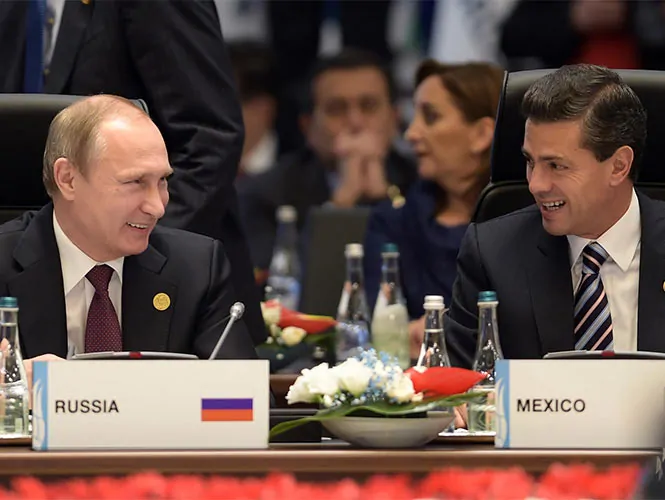RIO DE JANEIRO, BRAZIL – (Opinion) Even though Russia and Mexico have had diplomatic and commercial relations since 1945, export/import transactions between the two countries are relatively insignificant. For 2016, the annual trade between the two was equivalent only to the value of the goods that cross the border between Mexico and the United States every 31 hours; in fact, Mexico has greater commercial exchange with Guatemala than with Russia.

Faced with the trade war involved in the international policy of former President Trump, the constant threats to increase tariffs on steel and aluminum by up to 25%, in case of not stopping the transit of migrants across the border, Mexico has sought expand its commercial horizon to China and Russia.
In fact, former President Peña Nieto met with Vladimir Putin in 2017, in order to boost economic relations. A short time later, Minister Luis Videgaray traveled to Moscow to meet with his then counterpart Sergei Lavrov.
The Russian oil company Lukoil, in 2017 won the Round Two tender to explore a field in shallow waters, and a few days ago the National Hydrocarbons Commission approved the Lukoil Upstream México company, part of the 2021 Work Program.
It seems that in the case of the current administration, the objectives could be the same as the previous one – strengthening the bilateral relationship and increasing the trade balance.
In February 2019, just over a month after Andrés Manuel López Obrador assumed the presidency, a Russian delegation visited San Lázaro, the Mexican Congressional Building; some legislators said they were honored by the presence of such a distinguished delegation.
The Russian delegation was led by Senator Alexander Babakov, chairman of the Foreign Affairs Committee of the Russian Federation; he is said to be a representative of the kleptocracy that has made the country one of the most corrupt in the world.
His name appears in the “Panama Papers” scandal as a beneficiary of illicit enrichment schemes in Ukraine, through a company called VS Energy, of which Babakov had 100% of the shares until 2011, the year in which the company was acquired by a new owner, his 23 year old daughter. Babakov’s name is recorded in documents of the United States Department of the Treasury. The United Russia Party member is believed to be a crucial player in funding Marine Le Pen’s National Front.
There was another distinguished member of the Russian delegation that visited Mexico in February 2019, the representative of the company Bureau Legint. The director of operations of said company, which was founded in 2018, is Víctor Boyarkin, a former spy and suspected arms dealer.
US investigators suggest that the element served as a hinge between Paul Manafort, Trump’s former campaign manager, who was arrested for fraud related to his services as a consultant in Ukraine and the Russian oligarch Oleg Deripaska, one of Vladimir Putin’s main allies.
VLADIMIR PUTIN’S WISHES
Russia needs Latin America as a bargaining chip in the face of US sanctions and Mexico is a very desirable country on the geopolitical chessboard.
The democratic transition in Venezuela goes through a negotiation between Sergei Lavrov and the now Secretary of State of the United States, Antony Blinken. Venezuela has been used as a bargaining chip between the two countries, and continues to be used for that purpose.
In March 2020, Rosneft, the Russian oil company, announced the sale of its assets to a new company owned by the Russian state; the move was probably made to circumvent US sanctions and continue to support Nicolás Maduro.
Putin does not leave Venezuela for a simple reason: it is his strongest card in the face of possible negotiations with the United States. But what would happen if instead of one card, Russia now has two and the strongest card becomes one of the most important trading partners of its historical enemy? That ace up Putin’s sleeve could be Mexico.

